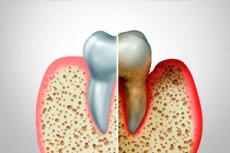
牙周炎是一种牙齿支撑结构的炎症,它会显著增加50岁以下无已知诱因人群中风的风险。《牙科研究杂志》的一项研究表明,口腔炎症越严重,中风就越严重。
牙周炎是一种口腔炎症性疾病,会破坏牙齿的支撑结构。赫尔辛基大学口腔颌面疾病系牵头的一项研究,探讨了年轻中风患者中与牙周炎和近期牙科手术相关的炎症变化。研究重点关注的是年龄在20至50岁之间、没有已知中风诱因的中风幸存者。
赫尔辛基大学医院 (HUS) 副教授兼神经学家 Jukka Putaala 表示:“近几十年来,此类中风的发病率一直在上升。”
赫尔辛基大学的研究员 Susanna Paiju 表示:“之前的研究表明,牙周炎会增加缺血性中风的风险,但对于没有传统原因的中风年轻患者,并没有明确的信息表明口腔炎症的重要性。”
研究发现,中风患者的牙周炎发病率明显高于健康对照者。牙周炎不仅会增加中风的风险,其严重程度也会影响中风的严重程度。
口腔微生物可能会增加血液凝固
研究发现,过去三个月内进行的拔牙或根管治疗等牙科手术以及尚未拔除的急性症状性发炎牙齿会增加中风的风险。
Payu 表示:“口腔微生物会因低度炎症而进入血液,但短期内也会因牙科手术而进入血液,尤其是在口腔内已有炎症的情况下。”
“通常身体会从血液中清除这些细菌,”她补充道。
牙科手术和牙齿问题对心房间隔存在卵圆孔(即未闭的卵圆孔)的人来说尤其危险。研究人员认为,卵圆孔可能导致血栓形成,从而引发中风,细菌从口腔进入血液也可能导致中风。
这种卵圆孔很常见,通常无需治疗。然而,其他研究观察到其与脑梗死相关,并已实施封堵手术以防止再次梗死。
微生物群很重要
口腔中含有人体第二大的微生物群,即细菌、酵母菌和病毒等微生物的群落——仅次于肠道。健康的口腔拥有平衡的微生物群,但当牙周炎发生时,微生物群就会发生变化,有害细菌就会趁虚而入。
“细菌以炎症破坏的组织为食,从而形成恶性循环。细菌的增殖反过来又加剧了炎症,”东芬兰大学转化牙科教授皮尔科·普西宁(Pirkko Pussinen)说道。
因此,及时应对与牙周炎相关的症状非常重要。
Payu 确认道:“应该拔掉坏牙,治疗炎症,并定期检查牙齿。”

